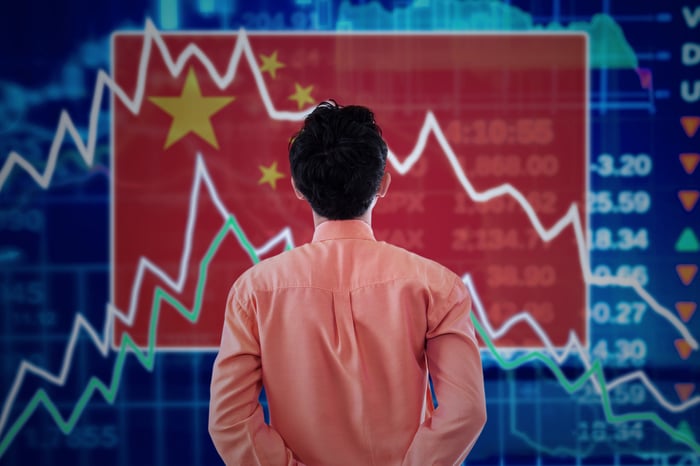Sound the alarm bells (or ring the dinner bell)! On Thursday morning, shares of Chinese e-commerce giant Alibaba (BABA 0.59%) dropped to as low as $91.09 per share.
And in doing so, they set a new 52-week low.

Image source: Getty Images.
There wasn't any obvious reason for Alibaba stock falling so far today. There was a less than obvious reason, however. Rival Chinese e-commerce company JD.com (JD 6.12%) reported a $0.5 per-share loss for its fiscal fourth quarter this morning. (The company also reported a $0.35 per-share profit but, unfortunately, that was a pro forma number -- not GAAP).
Reports on JD's loss blamed a slowing Chinese economy and weak consumer spending in the Middle Kingdom; both of these are trends that reinforce Alibaba's own assessment of slowing consumer spending, reported last month, and also confirm that the trend has continued for at least another month.
Alibaba is arguably one of the strongest Chinese tech companies in existence, yet its share price is down 58% over the last 52 weeks. The question that naturally arises is: Once this period of weakness has passed, will Alibaba stock look like a "buy" again?
I think it might. Consider:
At a $245 billion market capitalization currently, Alibaba stock sells for a nominal price-to-earnings ratio of 23.6 -- which doesn't look particularly cheap. Back out the company's $51 billion in net cash on its balance sheet, however, and Alibaba's cash-adjusted P/E falls to a more palatable 18.6x. Furthermore, Alibaba's $10.4 billion GAAP earnings arguably don't give the company enough credit, because according to S&P Global Market Intelligence data, the company generated just under $21 billion in free cash flow last year.
Valued on free cash flow, and giving the company full credit for its cash hoard, Alibaba's enterprise value-to-free cash flow ratio is just 9.3.
And no, that's not a typo.
Granted, even cheap stocks require at least moderate growth to justify their valuations, but the way I figure it, anything above 10% long-term earnings growth for Alibaba should be enough to make this stock a screaming buy.





